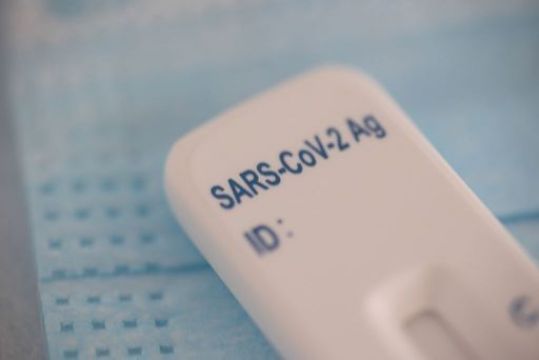From today, the HSE will begin registering fully vaccinated, asymptomatic close contacts for antigen tests.
All close contacts will get a text message which states that if not fully vaccinated and/or symptomatic they will be referred for a PCR test and if fully vaccinated and asymptomatic they will be sent antigen tests to do at home.
The text message will be followed up by a call from the contact tracers who will go through their vaccination history, symptoms and do the referral as appropriate for either PCR or antigen testing.
The contact tracer will take address details and antigen tests will be delivered by An Post in the regular post. Close contacts who fall into the category for antigen testing will receive a box of five antigen tests and will be asked to do three tests – the first test on the day they receive their test kit, the second test two days later and the third test two days after that.
PCR test
If antigen tests are positive the close contacts should book a PCR test – as part of that booking process they will be asked to tick that they had a positive antigen result.
"If a close contact develops symptoms while they are in the process of doing antigen testing they need to self-isolate and book a PCR test. Those whose antigen tests are negative are also asked to report their negative results via the HSE website," a HSE statement said.
Meanwhile, Minister for Health Stephen Donnelly has said that he was examining the cost of antigen tests as it was important for them to be affordable.
In a lengthy interview on Newstalk’s Pat Kenny show, the Minister also said he had asked the chief medical officer Dr Tony Holohan for his view on the possibility of a second or booster dose for people who had received the one dose Johnson & Johnson vaccine.
The Minister said he wanted to know if there was an argument for a second dose.
Today was a very important day for rapid testing, he said as leaflets would be delivered nationwide informing people who were close contacts about what they should do if they had symptoms. Mr Donnelly acknowledged that progress on antigen testing had been slower than he would have liked, but that it was now being rolled out as part of a wider deployment.
'Mandatory vaccination'
When asked why Ireland had not introduced mandatory vaccination for health care workers as had happened in France, the Minister said that the level of uptake in France had not been as high as in Ireland and that the “vast majority” of healthcare workers were vaccinated and those who were not vaccinated had been redeployed.
Ireland had one of the most successful vaccination programmes worldwide, he said and this was because the expert advice had been followed, that would continue to be the case and booster vaccines would be given cohort by cohort as advised.
Mr Donnelly said that he had given a “stark update” to the Cabinet’s Covid subcommittee this week as figures were the “fourth worst” since the beginning of the pandemic. The only reason the country could contemplate opening up was because of vaccines which was why it was so important to have full compliance from the hospitality and entertainment sectors and that only those who were fully vaccinated were allowed into venues and premises.
Hospital numbers
The current situation was serious with 500 people in hospital with Covid, that was a 20 per cent increase in one week and a 40 per cent increase in two weeks. Of the 100 people in intensive care, 60 per cent were unvaccinated.
The seven per cent of people who had chosen not to get vaccinated were putting themselves and their families at risk, he warned.
When asked if unvaccinated people should be told to isolate and stay at home, Mr Donnelly said he did not think they would comply if told to stay at home. “We’ve got to keep engaging and addressing concerns".
It was also important to make vaccination centres accessible “for some people it just needs to be very easy”.
Booster jabs
The final details of where and when booster shots would be given and if pharmacists would be included were being worked through, he said. Booster doses for over 60s will commence next week at vaccination centres while the 70 to 79 age group will get it through their GPs.
The Minister defended the decision to stop contact tracing among school children saying that the evidence was that transmission levels in schools were low and the majority of transmission was occurring in the community.
Anti-vaccination protests outside the homes of politicians and harassment on the street as had happened to Minister for Finance Paschal Donohoe was “not acceptable” said Mr Donnelly. The right to protest, and rigorous debate was essential in a democracy, but it should be done in an appropriate way.
It was unfortunate that inaccurate information was being dispersed on social media, he added, calling on the public to ignore any information that did not come from official channels.
The message was that Ireland was doing incredibly well as evidenced by the ranking on Bloomberg. “Irish people have been absolutely magnificent. We’re in a tough spot now, we just need to continue to do what we do so well and tighten up a little and go back to basics.” - Additional reporting from Vivienne Clarke







